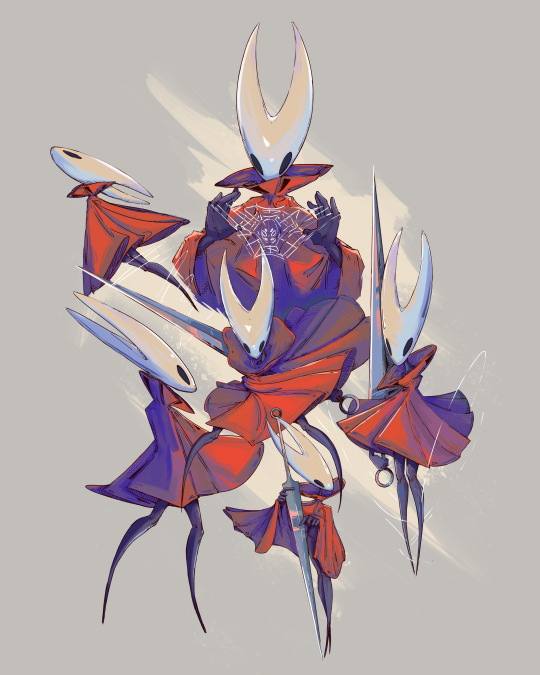You can call me Spark! I go by They/He pronouns. Feel free to ask me to draw anything Hollow Knight related!
Don't wanna be here? Send us removal request.
Text
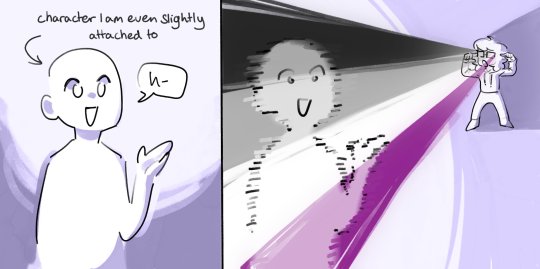
Sending the ace-ification beam directly at my blorbos…..... they’re all ace because I am and I said so
22K notes
·
View notes
Text
I BEG YOUR PARDON???
THAT IS A POKÉMON SIZED ANIMAL
THATS NOT REAL
if you’ve never seen one before
deer are smaller than you think
raccoons are bigger than you think
bears are smaller than you think but you were pretty close
otters are bigger than you think no even bigger than that
wolves are bigger than you think
wild cats are smaller than you think but hopefully you’ll never see one
chipmunks are smaller than you think
so are mice but you’ve seen a mouse right
you were right about the size of moose, mostly
pigs are bigger than you think
coyotes are that size
so are foxes
woops bears are bigger than you think but only that one type
this is an informational post about mammals if you know more please do tell
335K notes
·
View notes
Text

You just got NON BINARY FLAGGED
share this post to totally non binary your friends
2K notes
·
View notes
Text
Danganronpa is just ace attorney for weebs which is impressive considering that ace attorney is already a weeb game
12K notes
·
View notes
Note
hello! could you talk a bit more about the original (as in jp, not localization) ouma's personality and speech patterns? you've mentioned that he tends to trail off or speak more softly when it is implied he is speaking the truth, etc. and how he is not so loud/intentionally obnoxious. //btw when does he call himself a fairy? that's so cute

I got a couple of questions asking about the fairy line Ouma has, so I don’t mind sort of rolling them both into one! And I’m more than happy to talk a little more in-depth about Ouma’s speech patterns and personality in the original game, too!
Since I’ll be covering some late-game spoilers, I’ll put the bulk of this under the cut, so be careful when reading!
First off, I cannot stress how much I recommed playing ndrv3 with the Japanese voices enabled. If you’ve already played through the English dub but never experiened the original voice acting cast, I promise you won’t be disappointed. The Japanese cast are all fantastic, incredibly talented VAs who, unlike the dub, were hired specifically for these roles and not just re-casted from previous DR games.
Hiro Shimono as Ouma gives an absolutely incredible performance. The localization might still have many flaws in its translation and omission of certain lines or punctuation, but you can still very much get a feel for how Ouma’s character was intended by listening to Shimono’s performance. Re-playing the game with the Japanese voices will definitely let you hear how soft and tonally different Shimono’s performance is in places from the English dub, and compare it to the way in which many lines are written and punctuated as if Ouma’s yelling at everyone.
That isn’t to say that Shimono’s Ouma is never loud or excited: Ouma is a character whose moods and façades are all over the place, and therefore his performance requires a voice actor who can similarly change moods and intonation on a dime. Ouma is very much loud and haughty and deliberately annoying when he’s supposed to be, but his voice is also low and ominous at other points when he’s trying to be scary. And again, it’s soft and hesitant in places where he’s considering divulging some of his information, or when he’s insisting that all the things he does are for everyone’s sake, because he cares about them and doesn’t want anyone to die.
These moments feel so much more genuine in the Japanese version of the game--because they’re meant to be. As fantastic of a liar as Ouma is, it’s much easier for us, the player, to tell when he’s lying on a re-play, knowing the information from chapters 5 and 6 that we do, and looking at cues like his sprites (often his blank-faced ones) and, yes, his delivery of certain lines.
This probably sounds like me just gushing about what a fantastic voice actor Hiro Shimono is, and in part that’s exactly what it is, but I want to stress that pretty much every single voice actor in the Japanese cast is just as fantastic and that they all do their jobs incredibly well. With all that gushing out of the way, I’ll move on to talking about some of Ouma’s actual speech tics and the way he refers to other characters.
Like most things about him, Ouma’s speech patterns are sort of an interesting mix and even seem a little contradictory at times. He uses the very masculine pronoun “ore” (オレ), but he also refers to nearly everyone (with only a handful of exceptions) by their surnames and the much more childish honorific “-chan” (i.e. “Saihara-chan,” “Akamatsu-chan,” “Amami-chan,” etc.)
The use of “-chan” is very interesting. Honorifics in Japan are extremely complicated and tend to mean different things depending on who is using them. Typically, “-chan” is seen as a very feminine way to refer to someone else, commonly used in close-knit friend groups among school girls.
There are, of course, a few notable exceptions to this however: often times, middle-aged or elderly people will call a child “-chan” regardless of gender, as a way of showing they find them cute and endearing. And sometimes, people will use “-chan” to refer to other things they find cute, such as pets, or even to refer to themselves in a sort of informal, tongue-in-cheek way.
The fact that Ouma uses “-chan” as an honorific to refer to nearly everyone in the game stands out quite a lot: by and large, boys don’t use this term to refer to other boys. Using “-chan” to refer to anyone you’ve just met or don’t know very well is already somewhat frowned upon, but a boy using it to refer to other boys is especially rare. This helps set Ouma’s character up as someone who is both incredibly casual and informal with others (not to mention, you know, quite coded). Considering childishness and lightheartedness are traits Ouma values, and how much emphasis is put on him having “a very innocent, childish streak that’s hard to hate,” it makes sense then that he would talk like this.
Not counting Monokuma and the Monokubs, the only characters who Ouma doesn’t refer to with “-chan” are Gonta and Kiibo, who he simply calls by name. This also says some interesting things about his character.
Gonta is easily the character who Ouma interacts with the most often, as well as the charater he hurts the most in the end. Ouma’s choice to exclude Gonta from his usual way of calling people is, I think, a testament to how much Gonta really wanted to be friends with him, even if their friendship was never exactly on equal footing.
Meanwhile with Kiibo, I feel the choice to exclude him from his usual way of addressing others is indicative of how much Ouma tried to remind himself that Kiibo “wasn’t human,” and therefore how suspicious he found his presence in the killing game. We know Ouma suspected Kiibo and likely even had an inkling of his role as the audience proxy/camera in the game, due to how Kiibo’s picture is one of the only others set aside on his whiteboard besides Saihara’s, with the word “weird” written next to it (he also clearly guessed about the cameras after Gonta’s line in chapter 2, as we see from how he commissioned Miu for the bug-vac).
Ouma clearly enjoys teasing Kiibo a lot, and their banter reads very much like a manzai comedy duo; I feel like Ouma often tried pushing himself to remember that Kiibo “wasn’t human” on purpose in order to not get too attached to him or too distracted from his goal of ending the killing game. I don’t think Ouma’s decision to exclude Kiibo from the way that he very particularly referred to most of the rest of the group was just an accident or a coincidence.
Honorifics aside, Ouma also refers to several characters in interesting ways. He often uses “daisuki na ___-chan” (大好きな) to refer to some of the other characters, a phrase which more or less equates to “my beloved.” He uses this phrase with Saihara more than any other character of the game, but there are a few other instances where he does use it with Amami, Momota, and (if I’m remembering correctly) Kaede. Pretty much every single instance where the localization put, “because I love you” or “because you’re my favorite” whenever Ouma was talking to Saihara was usually a point where he would specifically call him “my beloved Saihara-chan.”
In chapter 4 during the scene where Ouma is alone in the parlor of the VR world, he also specifically, exclusively refers to Saihara as “suki ni natta hito” (好きになった人), literally: “the person I fell in love with.” This line was changed in the localization to, “when there’s a person I like,” which is more or less literally correct--however, the phrase “suki ni natta” is much heavier and more loaded with explicitly romantic implications than “suki” would be on its own, as it’s often used in Japanese love songs and shoujo manga love confessions.
Worth noting in my opinion is the fact that this is the exact same phrasing Maki uses to describe her romantic feelings for Momota. Since Maki’s feelings for Momota are considered canonically confirmed because of this, Ouma’s feelings should be considered equally canon, but a lot of people don’t know this because, well, it’s sort of been lost in translation.
And now, on to the fairy line! Ouma calls himself a fairy in chapter 3, when he pops up in the middle of Saihara and Korekiyo’s discussion of the katana in Korekiyo’s lab. Full of enthusiasm, he decides to touch the sword and examine it for himself; Korekiyo starts to object, but Ouma interrupts and says:
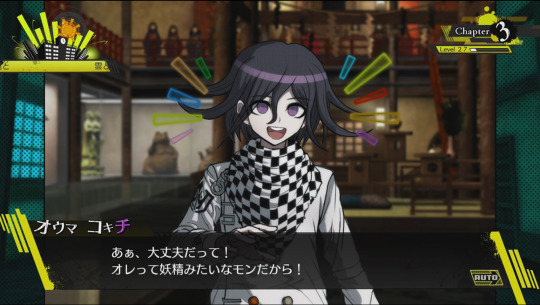
“Come on, it’s not a big deal! I’m like a fairy, so it’ll be fine!”
I’ve always really loved this line and thought it was super adorable, both as a nod to how fairies aren’t supposed to be able to touch steel in most fae mythos, as well as the fact that fairies tend to also have a love for mischief and pranks and lies. The localization apparently didn’t like it so much though, because this line is simply changed to, “Come on, would I lie to you?” instead.
One final thing I can think of as far as Ouma’s speech tics go is that his laugh in Japanese is romanized as “nishishi” instead of “neeheehee,” as this is closer to the Japanese onomatopoeia for the sound horses make--but I actually don’t mind this localization change at all! “Neeheehee” definitely looks a lot closer to the word “neigh” and helps capture that horse joke in a way that I feel like western players can more easily understand.
All in all, while I still definitely feel people can like and enjoy Ouma’s character from playing the localization alone, I still stand by my opinion that listening to the original Japanese voices helps give a much better picture of how the character was intended to come across, and really shows how much depth Hiro Shimono put into his performance. He’s quoted in the official ndrv3 artbook as saying that he believes Ouma is someone who’s actually “really meek if you take away his strong wish to outwit everyone” (credit to @kaibutsushidousha for the art book translation), and I think this interpretation of Ouma really shows through in so many of his lines.
Thank you both for the really fun questions! I hope I could provide some more interesting information about Ouma and the translation!
301 notes
·
View notes
Text
it tickles my brain in a good way nothing else can
:)
y'all don't understand how much i love crumb's animation for amnesia was her name its just so amazing everybody should go watch it rn
13 notes
·
View notes
Text
The real question is WHERE TF DID THE PITCHER GET A BABY TO THROW FROM
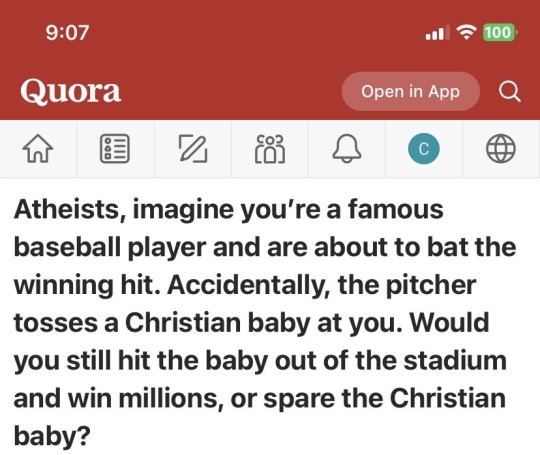
🤔
73K notes
·
View notes
Text

I hate family vloggers so much imagine having this little respect for your adolescent kid’s privacy and personal life
216K notes
·
View notes
Text
saw this massive onion bigger than my entire hand in the produce aisle and immediately snatched it up solely to weigh it and a guy across the aisle asked how much it weighed because he was curious as well and when i told him it was two pounds he excitedly was like “it’s like the biggest one i’ve ever seen..” humanity rocks moment. bonding with strangers over giant onion
53K notes
·
View notes
Text
people not being able to finish speaking because they’re laughing at their own joke. while telling it. that’s so endearing to me. and also sexy
49K notes
·
View notes
Note
its NOT gay they’re DEEPENING their bond as FRIENDS by uh. Exploring together. its literally so heterosexual you dont even get it im sorry but those men are not gay haha its normal its just some touching

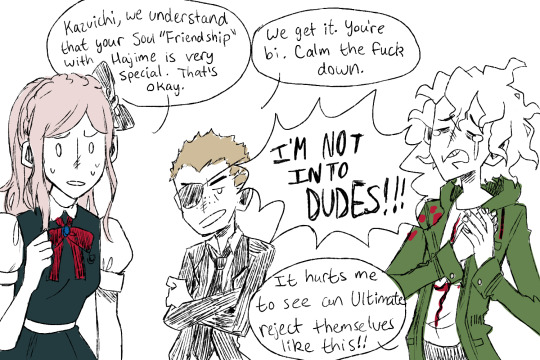
1K notes
·
View notes
Text
If you're a creator and you needed to hear this today:
You have no idea how many people lurk on your work. No idea how many times people go back to revisit your work. How big they smile when they simply think about your work. How fast their heart beats, how excited they get when they see that you posted something.
People are shy with their feedback. Sometimes it’s because they’re simply shy. Other times it’s because they assume you already know how great and talented you are. Could be both.
My point is, even if you barely have any likes or reblogs, don’t get discouraged. You have a lot of silent fans, but they are still your fans. Keep on creating. Because there is always someone out there who will love what you have made.
212K notes
·
View notes
Text
"amab or afab" im alab experiment that went wrong
66K notes
·
View notes
Note
Fuyuhiko is trying SO hard not to look at Hajime's honkers and I commend him for that

810 notes
·
View notes
